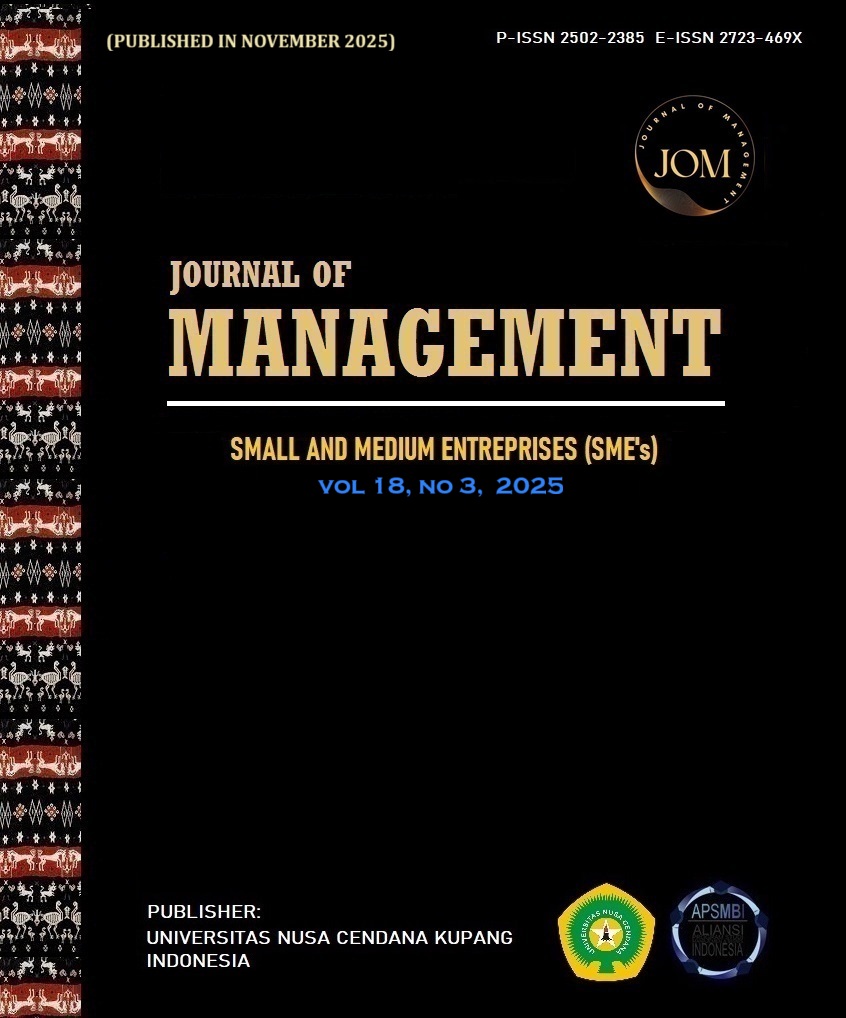THE INFLUENCE OF DIGITAL MARKETING IMPLEMENTATION AND INFLUENCER ENDORSEMENT ON CONSUMER PURCHASE INTEREST AT KEDAITA
(RAPPANG MAIN STORE PANCA RIJANG DISTRICT SIDENRENG RAPPANG REGENCY)
Abstract
This study aims to examine the influence of digital marketing and influencer endorsements on consumer purchase intentions, with trust as a moderating variable. Using a quantitative approach with a sample of 96 Kedaita consumers, data were collected through structured questionnaires and analyzed using multiple regression and moderation analysis. The findings indicate that both digital marketing and influencer endorsement have a positive impact on purchase intention. Moreover, trust strengthens the relationship between the independent variables and purchase intention, indicating its essential role in enhancing the effectiveness of promotional strategies. The results give us a deeper understanding of how trust functions within digital marketing dynamics, particularly for small businesses. Nonetheless, this study is confined to a particular regional context and consumer segment, potentially limiting the generalizability of the results. Future research is suggested to explore other moderating variables and apply broader population samples to validate and expand the insights.
Keywords: Digital Marketing; Influencer Endorsement; Trust; Purchase Intention; Consumer Behavior
Downloads
References
https://doi.org/https://doi.org/10.1016/j.jik.2024.100642
Bukhari, F., Hussain, S., Ahmed, R. R., Mubasher, K. A., Naseem, M. R., Rizwanullah, M., Nasir, F., & Ahmed, F. (2023). Consumers’ purchase decision in the context of western imported food products: Empirical evidence from
Pakistan. Heliyon, 9(10), e20358. https://doi.org/https://doi.org/10.1016/j.heliyon.2023.e20358
Cheng, X., Du, A. M., Yan, C., & Goodell, J. W. (2025). Internal business process governance and external regulation: How does AI technology empower financial performance? International Review of Financial Analysis, 99, 103927. https://doi.org/https://doi.org/10.1016/j.irfa.2025.103927
Connolly, B. (2020). Digital trust: Social media strategies to increase trust and engage customers. Bloomsbury Publishing.
Fenetta, A., & Keni, K. (2020). Pengaruh brand awareness dan perceived quality terhadap purchase intention: Brand loyalty sebagai variabel mediasi. Jurnal Manajemen Bisnis Dan Kewirausahaan, 4(6), 270–275.
Herman, B., Amar, M. Y., & Nohong, M. (2025). Determining Factors for the Success of Halal Certification in Sidrap Regency BT - Proceedings of the 9th International Conference on Accounting, Management, and Economics 2024 (ICAME 2024). 628–639. https://doi.org/10.2991/978-94-6463-758-8_53
Herman, B., Anwar, M. A., & Mursalat, A. (2022). Effect Of Organizational Commitment And Compensation On Turnover Intention Of PT Infomedia Nusantara. JPIM (Jurnal Penelitian Ilmu Manajemen), 7(1), 40–48.
Huda, M. (2024). Trust as a key element for quality communication and information management: insights into developing safe cyber-organisational sustainability. International Journal of Organizational Analysis, 32(8), 1539–1558.
Huda, M., Borham, A. H., Hashim, A., Ritonga, M., Almunawar, M. N., Anshari, M., Ahmad, R., & Hanafi, H. F. (2023). Strategic role of trust in digital communication: critical insights into building organizational sustainability. Proceedings of the Future Technologies Conference, 387–403.
Irfani, H., Yeni, F., & Wahyuni, R. (2020). Pemanfaatan digital marketing sebagai strategi pemasaran pada UKM dalam menghadapi era industri 4.0. JCES (Journal of Character Education Society), 3(3), 651–659.
Istikomah, I., Saputra, G. W., & Yusuf, M. (2022). Marketing Mix Strategy and Financial Capabilities in Improving Sharia Stock Investment. Journal of Applied Management and Business Administration, 1(1), 21–27.
Kelman, H. C. (1958). Compliance, identification, and internalization three processes of attitude change. Journal of Conflict Resolution, 2(1), 51–60.
Koch, T. (2024). Hovland, Janis & Kelley (1953): Communication and Persuasion. In Schlüsselwerke für die Strategische Kommunikationsforschung (pp. 377–387). Springer.
Kotler, P., & Keller, K. L. (2009). Manajemen pemasaran. edisi.
Makar, P., Kawczyński, A., Silva, R. M., Yildiz, M., Silva, A. F., & Akyildiz, Z. (2023). Validity and reliability of Polar M400 GPS watches for measuring distances covered by team sports players. Heliyon, 9(10), e20920.
https://doi.org/https://doi.org/10.1016/j.heliyon.2023.e20920
Mandal, S., Dubey, R. K., Basu, B., & Tiwari, A. (2025). Exploring the orientation towards metaverse gaming: Contingent effects of VR tools usability, perceived behavioural control, subjective norms and age. Journal of Innovation & Knowledge, 10(1), 100632.
https://doi.org/https://doi.org/10.1016/j.jik.2024.100632
Miglietta, A., Rizzo, M., & Loera, B. (2025). Disgusting, sustainable, odd: A study on consumers’ social representation of insect-based food and its association with TPB variables. Food Quality and Preference, 129, 105510. https://doi.org/https://doi.org/10.1016/j.foodqual.2025.105510
Nawaz, S. S., & Kaldeen, M. (2020). Impact of digital marketing on purchase intention. International Journal of Advanced Science and Technology, 29(4), 1113–1120.
Nohong, M., Sobarsyah, M., Sohilauw, M. I., & Herman, B. (2024). Nexus Between Strategic Green Finance and Green Competitive Advantage: Study at Indonesia Corporate. Journal of Environmental Assessment Policy and Management, 26(02), 2450003.
Nurbaiti, N., Fitriana, F., & Safrianti, R. (2024). Efektivitas Endorsement Influencer Terhadap Tingkat Penjualan Fashion Pada Online Shop Fitmeee. ID. Jurnal Busana & Budaya, 4(1), 393–407.
Oldham, G. R. (1976). The motivational strategies used by supervisors: Relationships to effectiveness indicators. Organizational Behavior and Human Performance, 15(1), 66–86.
Saniyyah, S., Adviola, T. F., & Swasti, I. K. (2023). Sosialisasi Digital Marketing Pada UMKM di Kota Blitar Sebagai Sarana Pengembangan Pemasaran Produk. Jurnal Riset Manajemen, 1(3), 30–39.
Sugiyono. (2014). Metode Penelitian Pendidikan Pendekatan Kuantitatif, Kualitatif, dan R&D. Alfabeta.
Torres, P., Augusto, M., & Matos, M. (2019). Antecedents and outcomes of digital influencer endorsement: An exploratory study. Psychology & Marketing, 36(12), 1267–1276.
Vahdanjoo, M., Sørensen, C. G., & Nørremark, M. (2025). Digital transformation of the agri-food system. Current Opinion in Food Science, 63, 101287. https://doi.org/https://doi.org/10.1016/j.cofs.2025.101287
Wardhani, A. K., & Romas, A. N. (2021). Analysis of Digital Marketing Strategies in the Covid-19 Pandemic. EXERO: Journal of Research in Business and Economics, 4(1), 29–53.
Wei, W., Zhang, L., Ying, T., & Zheng, Y. (2025). Pet influencer marketing appeal in hotel booking: Exploring the power of message appeal and boundary conditions. International Journal of Hospitality Management, 126, 104094. https://doi.org/https://doi.org/10.1016/j.ijhm.2025.104094
Weismueller, J., Harrigan, P., Wang, S., & Soutar, G. N. (2020). Influencer endorsements: How advertising disclosure and source credibility affect consumer purchase intention on social media. Australasian Marketing Journal, 28(4), 160–170.
Wilson, M., Obilo, O. O., & Mills, A. J. (2024). Brand responses to influencer scandals: An action plan for managers. Business Horizons.
https://doi.org/https://doi.org/10.1016/j.bushor.2024.12.002
Zhang, F., Zhang, Y., Liao, S., Zhou, X., & Ma, X. (2025). Research on the impact of matched effects between green advertising appeals and product type on consumer purchase intention. Journal of Retailing and Consumer Services, 85, 104265. https://doi.org/https://doi.org/10.1016/j.jretconser.2025.104265

 Muhammad Abi Rafli(1*)
Muhammad Abi Rafli(1*)



